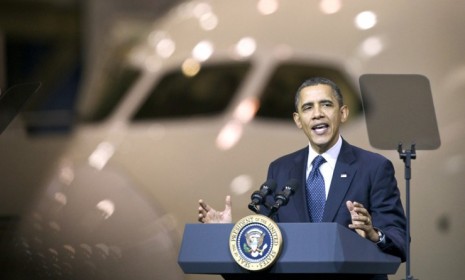The economic recovery: Proof Obama's stimulus worked?
After years of sputtering, the U.S. economy seems to be picking up steam. But Republicans say the president's policies have only gotten in the way

With the Dow Jones Industrial Average topping 13,000 for the first time since 2008, confidence is growing that the economy is finally on the mend. And President Obama appears to be reaping the political benefits, with his rising favorability ratings improving his re-election prospects. Republican presidential candidates, however, insist that the economy is improving despite Obama's burdensome policies, like the $787 billion stimulus package, not because of them. How much credit can Obama take for the economy's climb?
Obama's "ballyhooed" stimulus was an utter failure: The unemployment rate, which stood at 8.3 percent in January 2012, is literally unchanged from February 2009, says John Merline at Investor's Business Daily. There are now 5.5 million people who have been out of work for at least 27 months, up 83 percent from when Obama took office. And the civilian labor force has shrunk by 126,000 since Obama's inauguration. "In past recoveries, the labor force climbed an average of more than 3 million over comparable time periods." Obama's economic policies simply haven't delivered.
"Obama stimulus turns three: What has it achieved?"
The Week
Escape your echo chamber. Get the facts behind the news, plus analysis from multiple perspectives.

Sign up for The Week's Free Newsletters
From our morning news briefing to a weekly Good News Newsletter, get the best of The Week delivered directly to your inbox.
From our morning news briefing to a weekly Good News Newsletter, get the best of The Week delivered directly to your inbox.
Nonsense. The stimulus was integral to the recovery: Look, says Derek Thompson at The Atlantic. We'll never know with "utter certainty" whether the stimulus truly worked because "we can't compare this world, where the stimulus happened, to a make-believe world where it didn't happen." But if we objectively look at the data, "we can say with reasonable certainty that the stimulus did support growth, prevent layoffs, and make the economy better." And by most any measure — whether's it's real GDP or job growth — the "economic turnaround coincided with the passing of the stimulus." Give Obama credit.
"The stimulus absolutely, positively worked, no doubt about it, probably"
But the economy might not be recovering at all: "Employers are hiring, manufacturing is revving up, and stocks are rallying," says Annalyn Censky at CNN. But that doesn't mean a true recovery is upon us. A showdown with Iran could push gas prices to $4 or $5 a gallon this spring. Job cuts by cash-strapped states and other public agencies are a continued drag on the economy. (Remember, "the government is the largest employer in the country.") And the "escalating European debt crisis" could level the still-feeble U.S. and global economy. Clearly, we aren't "on the path to a sustained recovery" quite yet.
"Economy in recovery? Not so fast"
A free daily email with the biggest news stories of the day – and the best features from TheWeek.com
-
 Political cartoons for January 24
Political cartoons for January 24Cartoons Saturday's political cartoons include 3D chess, political distractions, and more
-
 Ryanair/SpaceX: could Musk really buy the airline?
Ryanair/SpaceX: could Musk really buy the airline?Talking Point Irish budget carrier has become embroiled in unlikely feud with the world’s wealthiest man
-
 Claudette Colvin: teenage activist who paved the way for Rosa Parks
Claudette Colvin: teenage activist who paved the way for Rosa ParksIn The Spotlight Inspired by the example of 19th century abolitionists, 15-year-old Colvin refused to give up her seat on an Alabama bus